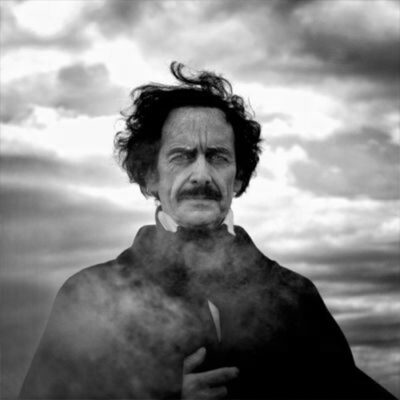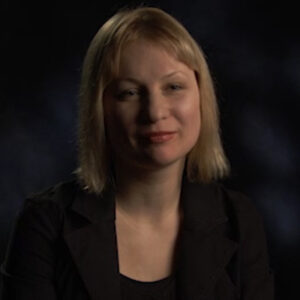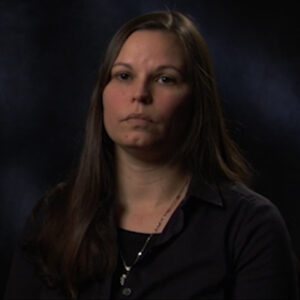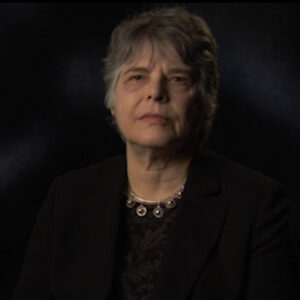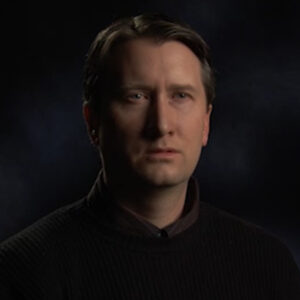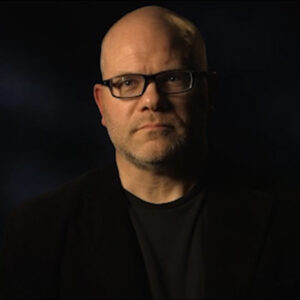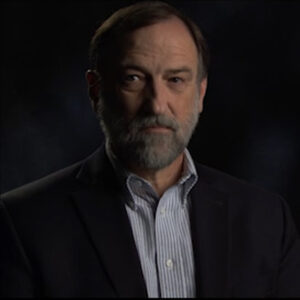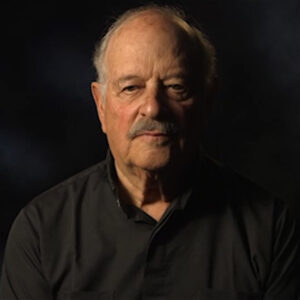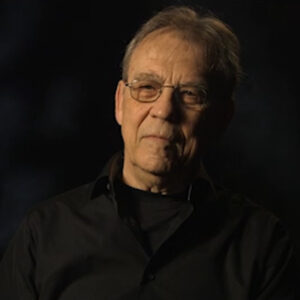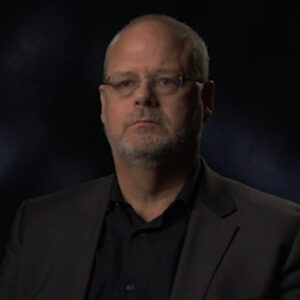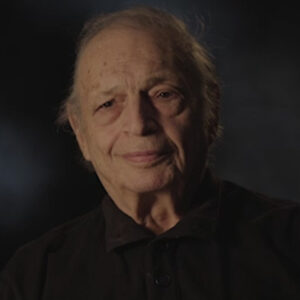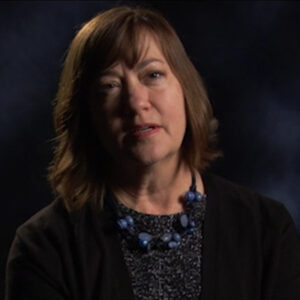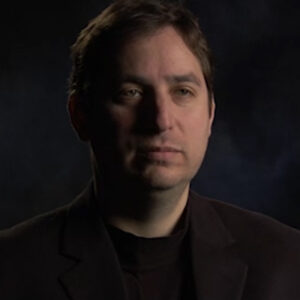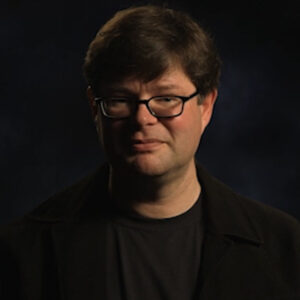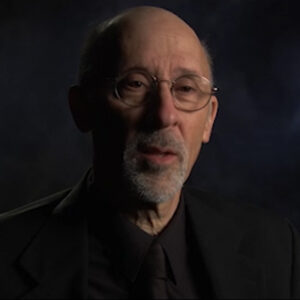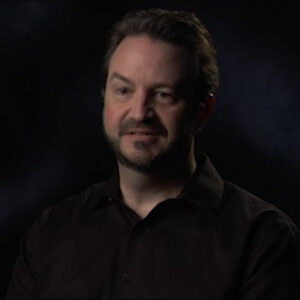Speaker Everybody said, yeah, OK, tell me about how you discovered.
Speaker What do you remember of your first readings?
Speaker You know, I was trying to I was trying to remember when I first found out that PO existed, I read him from such an early point in my childhood, oddly enough, that I don’t remember when I first encountered him. I there was a book with so good collected works. It was in the house. And I simply read it over and over and over again.
Speaker Do you remember whether it was the poetry or the tales or what it was you got into the first?
Speaker First of all, it was the poetry that interested me.
Speaker I of.
Speaker The you know, at worst, you have to say he’s very clever and I struggle with that, that’s not a kind of aesthetic judgment in certain ways. But from the point of view of a child interested in language, it’s amazing. And I, I feel very indebted to hope for sensitizing me so young to, you know, to the way that language on the basis of sound interlocks, the way rhythm dictates, you know, the rhythm, it dictates what is possible within the line and so on. It fascinated me. And after that I read the tales, some with more satisfaction than others.
Speaker Some of them are simply horrible, you know, others are extremely, extremely interesting.
Speaker Do you remember how or when you became aware of the whole mythology, the whole package of who he is and the way people think of him?
Speaker Well, you know, I have an older brother who took responsibility for helping me with the world.
Speaker And so when he noticed that I was becoming obsessed with Poe and memorizing poems and so on, he told me that he was considered a slightly doubtful character. And, you know, I just absorbed that into the whole experience.
Speaker The idea of your older brother protecting you. Yes, exactly.
Speaker Do you remember any of the lines of poetry that were especially.
Speaker Um, well, I memorized the entire raven, of course, I can’t I don’t I no longer have the entire Raven in my mind, but, uh, you know, these lines like this, the silken sad, uncertain rustling of each purple curtain thrilled me. You know, that there’s a just a lusciousness about the sonorities and so on in a line like that that had a great impact on me.
Speaker I really did.
Speaker From the New York Review of Books article, it sounds like you do know his biography somewhat. Um, feel comfortable talking about sort of who we was and how he lived his life and what his life was like. Sure.
Speaker Um, the young and the young man, 18, 19, 20, is a famous letter. He wrote to John in New York, I think, where he says, I’m not yet 20, but I’m a poet. If ever there was one or something, we can talk about what he must have been like and what he was up against.
Speaker He had Poe had such a strange place in the world, you know, being being the child of British actors born in Boston, living as if he were the son of a Southern mercantile family, which he was not, which he never became. In effect, the you know, there was everything ambiguous about his identity. And and I think that that was very much a subject for him, that that he felt the artificiality of any given circumstance because because he was never completely definable to himself. I think in a way, that’s why the identity of poet was so important to him, so isolating almost an insurgency for him. And he was every now and then you encounter people who are aware of their own brilliance, justifiably, and and feel more or less controlled by it. You know, um, and I have that feeling very much with Poe. He felt as if he he’s such an anomaly, even in his own understanding. And the brilliance that he feels in himself is one of the reasons for it.
Speaker That’s really interesting.
Speaker Can you talk a little more about that and maybe talk about his his but has never, never even having known his mother or not remembering her, what all those things have shaped and then by and of course, is trying to adopt that character as the sort of late adolescence.
Speaker Oh, well, you know, I have no idea what actually would have been true of himself in his family. I mean, among the Allans, he was apparently a prodigy as a child. They were very proud of him when he was still the little child. You know, apparently he, for example, was in a little military, but whatever you call them for little boys and was an honor guard for Lafayette when he returned to the United States.
Speaker And so, you know, and to be to be the darling of the showpiece almost of a family that never, in fact accepts you, that must be must have been extraordinarily strange, painful and liberating because.
Speaker Well, you know.
Speaker I think I think he accepted the identity of himself as a Southerner because it was challenged and he rejected the sense of himself as a Southerner because because of his more essential first identity and also because he wasn’t comfortable with it, you know, so it’s almost as if the the difficulties of his life created him and liberated him.
Speaker Poor man.
Speaker OK, um, the, uh, uh, a lot of people stop reading at a certain point.
Speaker I think he started as a writer for children or teenagers, but it sounds like you never stopped.
Speaker Well, you know, one of the things that I am fascinated by is the fact the unequivocal communications of value that I have received in my life. And certainly some of them came from Paul. And even though I find him hard to talk about, um, I’m fascinated by him because I cannot deny how much I learned from him.
Speaker You know, that one of the things in The Raven, you know, is the the quaint and curious volumes of forgotten lore. And I I am a typically devoted to quaint and curious volume of forgotten lore.
Speaker He created a sort of romance around learnedness that I think has been very, very valuable to me in my life. Um, and then again, there’s also, you know, the sense of his loneliness, which is so interesting. I he you know, that poem that called alone, you know, when childhood’s hour I have not been as others were. I had not seen as others saw. And so that is just so that was an important poem to me.
Speaker Again, liberating, you know, why was it that did you share those feelings or why was it so important?
Speaker Well, I think I think in adolescence, you know you know that you will not continue to be whom you have been and you have no idea who you are becoming, you know, and again, it’s that sort of difficulty of of identity that makes you aware of how artificial identity is and how there is a self that is more radical than whatever self you will learn to assume. I think that that poll communicates that very strongly, that the way in which his poetry and his stories are so often alluding to themselves as things made, you know, sort of ectoplasm, you know, and the you know, with the sort of implication that that there is a truer truth in a made thing than in something that can be taken as received.
Speaker Yeah, I mean, that’s so interesting, and I was one of the things I’m struggling with in the film is trying to explain his whole anesthetics and some of them are saying, oh, for for the sake of some. Larger truth, I don’t know what my question is, how would you how would you describe the systematic? Sensor is a static manifesto, really?
Speaker Well, you know, that’s one of the reasons that that’s that essay Eureka is so important to me because it seems to me as if it were rearticulate a sort of cosmology that is implicit, that can be seen in a lot of what is done up to that point or and what he will do afterwards. Well, they won’t do much afterwards. But but in any case, um, he takes his deepest intuitions, which are quite painful and which make, you know, idiosyncratic associations, for example, of Apsara with guilt. I think they’re all fused in all of his poems. Um, and he he implants them in a cosmology, you know, I mean, he’s not content to say this is my mood or this, you know, it’s sort of given the difficulty of, you know, giving him the maelstrom that we fall into and all the rest of it, then how can one move beyond that into an understanding of of reality itself, you know, and the fact that he goes from doing that imaginatively to actually making an incredibly ambitious philosophical construction around it, I think is amazing.
Speaker Eureka was certainly not not greeted with acclaim when. Oh, keep going back to it.
Speaker You can you talk a little bit about whether it’s an overlooked masterpiece or is.
Speaker What is it, except it’s a little bit hard to evaluate because, A, he starts out with some terrible puns and and and B, um, one of the things that’s remarkable about it is how much it anticipates, um, how how modern it is as a cosmology when you consider he had nothing to work from, really, you know, um, that, you know, it’s daunting. Um, the argument when he settles into the serious argument of the piece has a kind of aesthetic logic that again, is very impressive. Um, I think that I think that he has a correct intuition that, uh, aesthetics is intrinsic in this strange reality that we occupy, that it is not taste or, you know, or the decorum of a moment or something. It’s actually something very deeply implanted that and we have access to it as much by our capacity for aesthetic thought as we have through mathematics or or anything else.
Speaker I mean, with mathematics, you know, I have to confess, I can tried to read a I through a lot of people.
Speaker Can you talk a little bit about the paradoxes around here? I’ve been a, uh, wanting to be a popular writer, but also wanting to be really highbrow writer.
Speaker Um, and and also the fact that he’s considered an outsider or an outlier in American literature.
Speaker And yet he was very much at the heart of American literature at the time.
Speaker Mm hmm. Why is he so complex? Why are there so many contradictions?
Speaker Well, because he was, for one thing, very a very brilliant man, I think that that makes anyone fit oddly into any circumstance.
Speaker You know, um, he he did something in anticipation of later American culture that is very important. He was interested in popular culture. And I think that, you know, you see him through Baudelaire or something, and it’s like he’s an aristocrat monk or something, which is nonsense. But what he did, in fact, I think was a very democratic thing of saying these are popular obsessions. What is the what is the psychology? What is the metaphysics behind what a public will be fascinated by? You know, so he really anticipates the merging of of low and high culture or popular and high culture that I think is always fruitful and has been in many ways in this in this experiment of ours, the tales that the tell tale heart or.
Speaker Oh, the house of Usher. What was he tapping into and do you feel like it was something new in American literature? Was he doing something new or and what was he putting his finger?
Speaker Well, I think that he might he might have been thinking about slavery and, you know, not as not specifically, but in the sense of the, you know, the denial of the sister, the denial of the sibling, other, you know, who is virtually identical and nevertheless, you know, entrapped and left to die. And, you know, the guilt, you know, in The Tell-Tale Heart of of the man who commits the crime arbitrarily out of his own madness. And then, you know, the recoil has to happen. It has to the accusation has to be made. And, you know, I do think of what Jefferson said. You know, I tremble for my country when I reflect that God is just I think that a lot of that trembling went on and that this sort of divide itself of knowing and denying is something that he could have been talking about. Oh, not that slavery is the only circumstance in which that occurs, of course, but there is that his sense that there is something corrupted, that however refined, you know, Roderick Usher might be, there is something vile behind that. I think that’s very important to him.
Speaker Interesting, I’ve never I’ve never heard people certainly talk about human slavery, but not the tales of. The guilt that you’ve written about has explained that. In terms of his stories, where do you see the guilt and what is what is that?
Speaker Well, you know, when you think of a poem like The Raven, which has the last liner, you know this there’s the sense of, you know, the fact that he cannot he’s forbidden by this bird to have even the thought, even the hope of reunion with Lenore. You know, and this this sort of implies to me that he has he’s lost the right to her, not simply losing her, you know, in herself.
Speaker There’s a.
Speaker He he says, you know, that that line I was quoting, that so sad and certain rustling of a purple curtain thrilled me, filled me with what I’m trying to think of. The line filled with terror is never felt before. In effect, you know, there’s a hyperbolic quality and this is characteristic of him and, you know, living in an age where people did die with, you know, incredible regularity and under very painful circumstances. He’s never merely writing about death. I think that he could very well feel great uneasiness about his relationship with his wife, his poor little wife, uh, simply because his own uncontrollable alcoholism and so on made it even harder than it had to be for him to keep her and keep her in health, you know, things like that. I mean, everybody has guilt, right, from if that happens to be the subject. But I think that the you know, if you think of him, he’s outside what we call the categories that we normally use for American sensibility in its early period. He’s not a Calvinist. You know, he to the degree that he had a religious background, I don’t know what it was. But it it’s guilt feels different for him because it is so isolating. You know, the idea of original sin simply means, you know, good luck with all of us, you know, but for him, it’s as if it’s a thing that that he even must be hidden from himself, you know, and that’s the energy behind so much of what he writes.
Speaker I Gordon.
Speaker What what is going on there now and why do you think it was the only novel he ever wrote?
Speaker Well, I think that he well, uh, I think he found it difficult to write. I think people found it difficult to write at length. Um, he was always trying to sell things to magazines, basically, you know, um, then published collections. I, I don’t think that his worldview fit into a short form. I mean, into a long form. Pardon me.
Speaker I don’t think post-World War you fit into a long form story over right from my.
Speaker I don’t think I don’t think I don’t think Paul. But I don’t think Paul’s worldview fit into the long form. I think that the kind of recoil that he, uh, that formed his moral imagination, uh, simply did not play out at that length.
Speaker This is very I’m sorry.
Speaker I should have asked if you want some water here or I’ll take a break.
Speaker This is really interesting because everything is like something or some other question. My problem is that I was wearing, uh. What about Poe and foreign influence, I mean, people. Well, he has that famous when he was some critics said he was stealing from the German Gothic tradition. So it’s not of Germany. It’s terribly soul or something.
Speaker But what what foreign influences did he take on and how did he change them and use them to express them differently?
Speaker Well, you know, I mean, he makes a lot of allusions to German Catholicism of one kind or another, um, I think that this is, again, part of a posture for him. I don’t think he was so much interested in foreign influences. He was in the manner of a voice that would make the kinds of references that he makes. It was a persona of a kind of super knowledgeability that has an obsessive quality about it and alienated quality about it. Uh, he’s always he he tries to use the he or he uses a voice that tries to sound as if it were in perfect control. And then over the course of things, it deteriorates and you become aware. But the part of the control is the implication that he essentially knows everything, you know.
Speaker And so you get these illusions outside, you know, outside the skull, you know, there’s one little you’re right, which is kind of like, uh, is something else.
Speaker You wrote about that he was accused of vulgarity, of bad taste of excesses.
Speaker So it sounds like a car wash.
Speaker Oh, this is how we do it for us. Oh, yeah, I was just saying I was.
Speaker Um, yeah, so talk a little bit about I mean, what is this thing with vulgarity and Access’s was he in bad taste and does that matter? What was he trying to do with all that?
Speaker Oh, well, I think he does lapse into very doubtful taste every now and then. Baronetcy, I think, is one of the least attractive stories in American literature. Um. But he I I think that his successors are interpretive. I think that you would have to look at the context within which he was writing in order to make those judgments. If you look at like William Gilmore Sims, you know, um, he is writing with the kind of aura of refinement, but there is a much profounder vulgarity in him because he plays on very mean cultural assumptions. Um, it seems to me as if Poe is very elegant by comparison and what he plays on in public, in popular the popular mentality are things like obsessions with fear and and violence and so on, and a certain kind of artificial elegance that colonial people are disposed to admire. You know, uh, he’s he’s interested in pushing conventions to the point where the real workings of the convention as such can be seen, you know, and you know, and Emerson or Whitman might find that vulgar because they’re trying to break new ground. You know, he’s simply breaking other new ground, I think.
Speaker Not recognized more in the South today, and we know he was somewhat successful. What was going on? Why did he have such a hard time?
Speaker I think it’s hard to know what his career would have been if he were not so afflicted with other problems, you know, I mean, his apparently, you know, if anyone did him a kindness, he retaliated, you know, not with kindness.
Speaker You know, I think that he you know, when people were drinking, then you wonder what they were drinking because there was no way to, you know, guarantee the proof or anything of anything that they were taking on. And I wouldn’t be surprised if if he did himself harm over time, you know.
Speaker It’s then there are things that are so baffling, I mean, the fact that the raven basically swept the country, but he didn’t seem to make any money from it at all, you know, that sort of thing where you would think that someone who was a successful editor would be shrewd enough to find out, you know, how this could work to his benefit. But he seems to have been completely indifferent to that.
Speaker Can you talk a little about the so-called Longfellow border? I mean, at that same moment? You were saying you decided to. Essentially, wage war on my fellow means what what was going on?
Speaker I have no idea. I really don’t owe people like, you know, knowing that dominated American literature. And it was the consequence of of very practical things, like the fact that from a very early point, it had way more printing presses than there were in the South and much larger industry of publication. And it had, you know, could colleges and schools. So it was based around the culture of literacy. And people people are still sort of resentful of the dominance of New England as if it were some sort of a patrician ism, you know, when in fact it was a pretty natural consequence of who they were and what they did. I think that from the point of view of creating the standards by which someone like Paul would be found wanting the dominance of the New England writers was very important. At the same time, he was very he was selectively but deeply sympathetic to certain New England writers like Lidia’s Sacranie, whom he treats as if she was Shakespeare, you know, and that, frankly, I read a good deal of Lydia Sigourney. And he’s a lot kinder to her than I am, you know.
Speaker But it is true that he was not.
Speaker The only regional but I think that a God knows it wasn’t, but but I think something like that, something like just the feeling of the domination of Longfellow. That’s what he was attacking, I think.
Speaker I mean, you keep you keep bringing up things that I wanted to ask.
Speaker So this is sort of a wide open question, but what do you think he’s done for American literature? But historically but but still, what is his role and what is his usefulness?
Speaker Oh, that’s an interesting question. I think that I think that he has such a strange reputation that there are people probably who have been influenced by him and actually sort of implied that part of their intellectual career. Um, he he has a strange history through French writers like Chris Burns and Baudelaire, of course, and others.
Speaker Um, and that has come back. I think that his influence has been deflected off French literature much more than it’s been directly acknowledged, at least within American literature. Um, I think that Butler is a very bad interpreter of Paul. But then, of course, you know, he was outside the culture and was only fluent enough in the language to read Poe. So, um, I mean, he learned English in order to read Poe, uh, but seeing him as the victim of so ocracy as is what they’re called it, uh, and that’s opportunistic.
Speaker That’s what they’re trying to be safe in 1849, you know. But it’s also a misreading that distracts attention, I think, from Paul’s real intent, um, his real attempt to see an original aesthetic and literature arising out of precisely out of democracy, out of popular culture.
Speaker I meant to ask you earlier, if you don’t mind going back to Sheriff or Gordon. You read about slavery, Pam, and other things, and maybe just talk about the slavery argument and what what what does the pope bring out in that novel?
Speaker And I forgot him post starts out quite conventionally, you know, with the you know, all the things about being a stowaway on a ship and that sort of very 19th century. And he he creates this character, the the Blackfoot from the Black Hills, you know, who is a quite a demonic looking character when he’s first introduced. But then as they get further into this, you know, this world that they find of blackness, that I’m forgetting the character’s name at the moment.
Speaker You know, Mark, Margaret, she’s almost infallible. But I guess unless you want to just get.
Speaker Yeah, exactly. Um, in any case, is that as they go into this world, that is of blackness and and it becomes Solomonic and it becomes it has, you know, the handwriting on its wall and all this sort of thing and the irony of the aggressiveness of the European macwhite, the American, whatever they are saylor’s you know, relative to these unthreatening people, the way he goes, they go through their world and sort of appraise its goods like they were just, you know, waiting there for them and so on. It seems to me that this is a very, very telling, uh, analogy for European, you know, exploration and I don’t know another one like it, frankly. And then, of course, when they go beyond Salal, I think is the name of the black world, when they go beyond that and the horror builds, as it does in his maelstrom stories and so on, it becomes wider and wider. And in every that whiteness is a source of terror to those who are black, everything that is black, you know, and the very birds are singing, you know, you have been weighed in the balance and found wanting. And then this great white figure rises with the implication that they are approaching, you know, God knows what. But in any case, the emergence of the white figure is like the the confession of The Tell-Tale Heart, or it’s like Roderick Usher burying his twin. You know, it’s it’s the return of the self, the confrontation with the self, which is the great dynamic in his in his imagination.
Speaker It’s an animal you’re thinking about.
Speaker But I’m just I know it’s tough over.
Speaker Stop. All right, let’s keep going. Have a poster up again. I got, um.
Speaker You talked about this right at the beginning, but can you talk more about how he influenced your son? And so later in life you can make any specific connections that or any of your own your own works or ideas that you feel especially.
Speaker Somehow you, um, well, you know, I don’t know if he helped me because I tried to write poetry like his for a long time and, you know, it was it was juvenilia and it was engrossing and lovely to me because it sounded very poor, like I even have a poem. My brother brought it to me. He somehow or other kept it. But this is building terror. And at the end, he’s confronted by a face, the twisted image of my own, you know, and this sort of thing, you know, where that that people recoil is is the basis of the poem and so on. Um, I was so struck by Poe as a poet that I wrote only bad poetry. And over a certain period of time, I began to realize that instead of writing prose.
Speaker So that’s a fairly big part of your problems.
Speaker Well, it’s you know, there’s a way in which the sort of deeply satisfying associations of words and sounds, rhythms, it always seemed to me and I think it seemed to him I think I learned it from him, that there is there is more to this than simply this sort of Felicity, you know, that that the actual expressive range of language is almost infinitely wide or infinitely subtle because we can indeed make these kinds of, you know, allusions. And, you know, if there is there’s a way in which something beautifully said is qualitatively different from something that simply adequately said. And this is true because it evokes more more reality. It has a larger burden of reality. You know, um. And I don’t know quite how to I don’t know quite what all of that implies to me, I think that we we have a kind of an anthropological habit of imagining that complex language is simply language built on simpler and simpler habits or, you know, but it’s something other than that. It’s a it’s a music we are competent in for reasons that are very difficult to describe. We can actually say things that have never been said before, which is just amazing and bringing them back to power. First time doing that or one of the most important, um, well, you know, they had different objects in mind, you know. I mean, when I’m saying this about language, I sound like I’m talking I sound like a Emerson, I suppose in a way, you know, um, but Emerson is using language rhetorically. And however beautiful it is, it’s you know, it’s meant to enlist, you know, engage, convince, you know, how is along with language and and and feeling it in that that way that I often feel as though he’s distracting himself from a painful thought or, you know, by by sort of making it using language, using deception to make it beautiful and painful. You know, um, it’s a different mind. And, you know, one of the things that’s charming about it in the American literature is that you can kind of, you know, count its practitioners and both hands. So every one of them is doing something that it bespeaks a particular mind and that’s very visible.
Speaker I only have a couple of more things, a little more water.
Speaker Yeah. Are you OK? I’m very OK. OK. This is really wonderful. Uh. I mean, I just can’t imagine I’m going to tell them the stuff that I feel when I hear that I think raccoons are on my roof.
Speaker We’re just gonna have to hope, which is I mean, the noise is going to be. Yeah. Mm hmm. Is is disappearance and death. But, um, how do you think that just adds to the whole mystique? What is why is that important? Is it important at all?
Speaker Well, it’s I mean, I think that a lot of his. Life was lived in anticipation of his death.
Speaker You know, I mean, I think that, you know, inevitably when it came, it was as if it came, you know, unfolded with this whole language of expectation and so on at the same time that, you know, what was he, 49 or something that wasn’t terribly 40, OK?
Speaker I mean, he was pretty died there.
Speaker I almost remember that’s an accomplishment. In any case, that wasn’t a terribly young death for someone living in that time. I don’t think death from alcoholism would have been particularly rarer than either. You know, I think there are people who want to sort of put paid to Edgar Allan Poe that there are, you know, like Rufus Griswold, for example, and they made a sort of moral tale out of an ending. That in itself could not have been all that remarkable as much as I regretted.
Speaker It’s interesting to see so enduring generation after generation never goes, it’s never been out of print since he died. I mean, there are other writers in America. I’m sure there are. But still, it’s not that you actually want to see. Hang on the.
Speaker I think that people have a very correct intuition that there’s something very profound going on in his writing. You know, um. I you know, when you read something like the mask of the Red Death, you know, it doesn’t sound it sounds like a parable. It’s almost biblical. You know, I don’t think that, you know, I mean, I think that it’s the psychology of unacknowledged guilt is something that does not cease to be a subject that people can usefully ponder. What it what at the crudest terms, I think it’s it’s something that they cannot fail to recognize, really. It’s not. We have lost interest in inwardness. I think, you know, we’re much more interested in in trying to regularize our psychological experience than we are to plummets depths. But there are depths to the depths are still there. And we all live, I think, always with the sense that the the apparent goodness of virtue or normative ness of our lives is a is a very thin veil between us and, you know, things that we would be afraid to acknowledge. This doesn’t stop your favorite story. Oh, I remember liking Logia awfully well, the follow that I’m I got the you know, the great stories I like the most, um. I you know, the poems that I mentioned alone, I think is where I wanted my youth usefully to hell in this very pretty, you know, Uloom, uh, that, you know, the things that he does that are so interesting or like when at the beginning of The Raven, Poe says Once upon a Midnight Dreary and that little once upon, you know, it qualifies what he’s saying as as being like a fairy tale or like a romance, you know, very interesting, interesting choice. And in Uloom, he alludes to painters and, you know, as the as the creators of the landscape that the poem inhabits and things like that, I think are very, very interesting. What they do in terms of of characterizing the whole moment of imagination.
Speaker That actually does remind you of another question that his famous unity of effect, that principle as a writer, how do you think? I mean, can you just describe it very briefly what he was saying writers ought to do? And do you agree or disagree? Do you think it’s a useful way of looking at literature?
Speaker Well, people thought that, you know, that a perfect picture would be read in one sitting, as I recall, and that every detail of it should be groomed basically to achieve the one effect that the story was lived with, lived for. As a novelist, I don’t find that terribly, terribly useful. I think that he was often drawn into of, you know, how to write a Raven poem or how to, you know, those kinds of things that were there that are prescriptive in effect. And I don’t think that he himself would have accepted prescription that everything could be done differently by anybody. That’s certainly what I would say. You know, do say.

